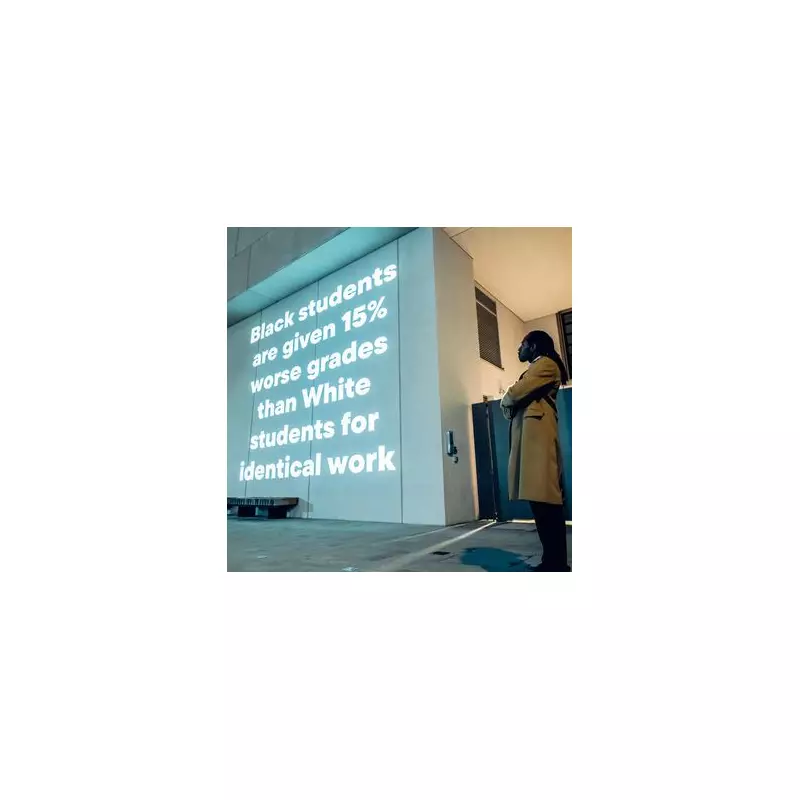
Scientific Evidence of Racism Projected Across London Landmarks
Londoners witnessed a powerful visual demonstration of systemic racism this week as stark scientific statistics were projected onto prominent city buildings. The illuminating displays, drawn directly from Professor Keon West's groundbreaking new book The Science of Racism, transformed the capital's skyline into an undeniable presentation of racial disparities in modern Britain.
The Uncomfortable Truths Displayed Across the Capital
From the National Theatre to government buildings and St Thomas' Hospital, giant projections displayed measurable racial inequalities that many Britons prefer to ignore. Unlike political statements or personal opinions, these declarations represented scientific findings from controlled studies conducted across various sectors of British society.
One projection outside the National Justice Building revealed that Black people are 25% more likely to be found guilty than White people when facing identical evidence. Another near the Courts of Justice displayed research showing that Black students receive 15% worse grades than White students for exactly the same academic work.
Perhaps most alarming was the statistic projected outside St Thomas' Hospital, indicating that Black patients wait 42% longer for medical appointments than equally ill White patients. This finding echoes recent NHS data showing Black women are up to three times more likely to die during pregnancy, childbirth or the postnatal period compared to their white counterparts.
Confronting Denial with Data-Driven Evidence
Professor Keon West, the social psychologist behind both the book and projections, designed this public demonstration to combat what he describes as a dangerous shift in public discourse. "We're in a position now where we're having a very serious conversation about racism and in which society on a whole is shifting away from believing that racism is real and away from believing that it's a real problem," Professor West explained.
His research methodology involves rigorous scientific testing that removes subjective interpretation. Regarding the educational disparities, he clarified: "When we talk about Black students get 15% lower grades for the same work, we mean that we run experiments in which we send exactly the same work to hundreds or thousands of instructors. We just change the name to make it look like it's a white student or a black student, and the black students will get lower grades."
Despite his long familiarity with these statistics, Professor West admitted that seeing them projected across London landmarks affected him deeply. "I've known these things for a long time, so these are facts I've been very familiar with for a while but I have to admit that when I saw them, it made me very sad," he confessed.
Why Science Matters in the Racism Conversation
Professor West deliberately chose to centre his work on scientific evidence rather than personal anecdotes, despite suggestions that lived experiences might be more compelling. "Stories can be easy, but in some ways, while they can make an immediate emotional connection, they don't necessarily prove things that we're trying to prove," he argued.
The social psychologist emphasises that the scientific research on racism is "incredibly clear" and demonstrates that racism definitely exists, it's definitely pervasive, it definitely affects every area of our lives. He maintains that "we can test it, we can measure it, we can track it, we can quantify it - we have science for a reason and we should use it."
Professor West identifies a troubling tendency to displace racism to the past, noting that "It's easy to pretend that racism is a problem of our grandparents or of someone far away or someone from another country." His research proves otherwise, showing that measurable racial disparities persist across education, healthcare, criminal justice and employment in contemporary Britain.
The landmark projections and Professor West's book represent a determined effort to change the conversation around racism in Britain, replacing political arguments with quantifiable evidence. As the glowing statistics illuminated London's buildings, they presented Britons with a simple challenge: to acknowledge what the data proves impossible to ignore.





